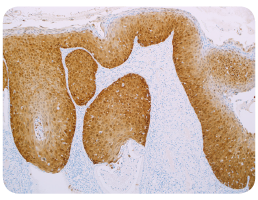Cell Marque – p16INK4A
THESE PRODUCTS ARE NOT AVAILABLE FOR PURCHASE BY THE GENERAL PUBLIC.
One of the essential antibodies used in the panel for differential detection of cervical dysplasia is p16INK4A.
Cervical dysplasia, also known as cervical intraepithelial neoplasia (CIN), is a precancerous condition characterised by the presence of abnormal squamous epithelial cells on the cervix. It is primarily caused by specific strains of human papillomavirus (HPV).
Early detection and accurate diagnosis of CIN are crucial in preventing the progression to invasive cervical squamous carcinoma.
p16INK4A and its role in cervical dysplasia
p16INK4A is a cyclin-dependent kinase inhibitor expressed in various tissues. It is a specific tumor suppressor protein found in neoplasms, including cervical dysplasia and squamous carcinomas caused by high-risk HPV infections.
Immunohistochemistry using p16INK4A is the most common test performed on cervical biopsies to determine the presence of CIN caused by HPV. It is considered a surrogate test for HPV testing in squamous intraepithelial neoplasms.
Benefits of p16INK4A (JC2):
- In vitro diagnostic: p16INK4A is an in vitro diagnostic tool used for the detection of CIN.
- Nuclear and cytoplasmic visualisation: The antibody allows visualization of p16INK4A in both the nucleus and cytoplasm of cells.
- Compatibility with multiple automation systems: p16INK4A is compatible with various automation systems, making it convenient for laboratories.
- Published clone: The p16INK4A clone has been extensively studied and published in scientific literature.
- High sensitivity and specificity: p16INK4A demonstrates high sensitivity and specificity for squamous intraepithelial neoplasms in the cervix, anal canal, throat, and other sites of HPV infection.
Learn more about the Cell Marque p16INK4A











